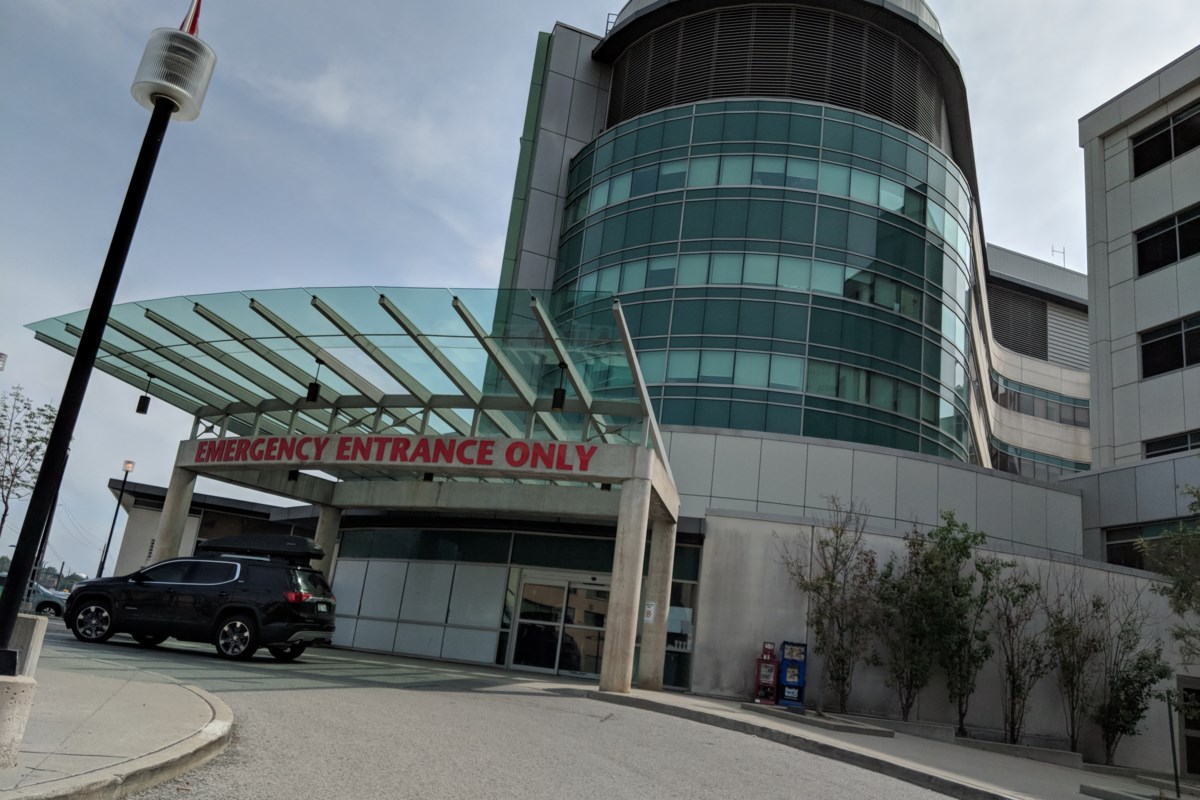Health
Hospitalizations from COVID-19 in B.C. fall to level last seen in November – Richmond News


The trajectory of serious COVID-19 infections in B.C. continues to point in the right direction, as the number of hospitalizations, and intensive care unit (ICU) patients, continues to fall.
The province now has 320 people hospitalized with the virus that has spawned a global pandemic. That is nine fewer than yesterday, and the lowest total since November 30.
The number of hospital patients in ICU is similarly falling, as it is down by four overnight, to 66, which is the lowest total since November 26, according to government data.
Unfortunately 14 more people died overnight from complications related to the virus, pushing the death toll in B.C. to 1,104 since the first death was recorded on March 9.
New cases continue to pile up, with 500 people newly diagnosed with COVID-19 in the past day, and only 465 people newly diagnosed as having recovered. Testing also ramped up substantially, compared with yesterday, as 10,437 tests were given. That pushes the positive-test rate down to 4.7%, compared with 9.22% yesterday.
More than 89%, or 55,564 individuals out of the 62,412 people identified in B.C. as having contracted the virus, are deemed to have recovered.
The vast majority of the 4,345 people actively infected with the virus have been told to self-isolate, while 6,905 people are under active health monitoring from officials because they are known to have been in contact with others who have tested positive for the virus.
Here is a regional breakdown of where the 500 new cases were identified:
• 125 people in Vancouver Coastal Health (25%);
• 216 people in Fraser Health (43.2%);
• 32 in Island Health (6.4%);
• 91 in Interior Health (18.2%);
• 35 in Northern Health (7%); and
• one person who resides outside the province.
Despite fewer doses of vaccine expected to be delivered in later January than first expected, there were 5,756 vaccinations completed in the past day, for a total of 98,125 since the first dose was administered on December 16.
”We have had two new health-care facility outbreaks: at Villa Cathay in the Vancouver Coastal Health Authority, and Acropolis Manor in the Northern Health Authority,” provincial health officer Bonnie Henry and Health Minister Adrian Dix said in a joint statement.
“The outbreaks at Guildford Seniors Village and Maple Ridge Seniors Village in the Fraser Health Authority, as well as Mountainview Village and Village by the Station in the Interior Health Authority, are now over.”
They added that there has been one new community outbreak at the Surrey Pretrial Services Centre.
“Our COVID-19 curve is trending in the right direction, and we want to keep that going – to push our curve down, which in turn, will allow us to safely ease restrictions,” they said.
The nine hospitals identified as having active COVID-19 outbreaks are:
• Burnaby Hospital in Burnaby;
• Cariboo Memorial Hospital in Williams Lake;
• Chilliwack General Hospital in Chilliwack;
• Mount St. Joseph’s Hospital in Vancouver;
• Ridge Meadows Hospital in Maple Ridge;
• St. Paul’s Hospital in Vancouver;
• Surrey Memorial Hospital in Surrey;
• Vancouver General Hospital in Vancouver; and
• University Hospital of Northern B.C. in Prince George.
The nine active outbreaks at seniors’ living facilities in Vancouver Coastal Health are at:
• Arbutus Care Centre in Vancouver;
• Braddan Private Hospital in Vancouver;
• Fraserview Intermediate Care Lodge in Richmond;
• German Canadian Benevolent Society Home in Vancouver;
• Hilltop House in Squamish;
• Little Mountain Place in Vancouver;
• Minoru Residence in Richmond;
• Renfrew Care Centre in Vancouver;
• Sunrise of Vancouver in Vancouver; and
• Villa Cathay in Vancouver.
The 23 active outbreaks at seniors’ living facilities in Fraser Health are at:
• Avalon Gardens in Langley;
• Brookside Lodge in Surrey;
• Eagle Ridge Manor in Port Moody;
• Evergreen Baptist Care Society in White Rock;
• Fleetwood Villa in Surrey;
• George Derby Centre in Burnaby;
• Good Samaritan Delta View Care Centre in Delta;
• Hilton Villa Seniors Community in Surrey;
• Kin Village in Tsawwassen;
• Kin Village West Court in Tsawwassen;
• Madison Care Centre in Coquitlam;
• Mayfair Seniors Living Care in Abbotsford;
• Menno Home in Abbotsford;
• Morgan Place Care Facility in Surrey
• Nicola Lodge in Port Coquitlam;
• Peace Arch Hospital Foundation Lodge in White Rock;
• Queen’s Park Care Centre in New Westminster;
• Rideau Retirement Residence in Burnaby;
• Royal City Manor in New Westminster;
• St. Michael’s Centre Extended Care in Burnaby;
• Suncreek Village in Surrey;
• The Harrison at Elim Village in Surrey; and
• Waterford Retirement Residence in Delta.
The two active outbreaks at a seniors’ living facilities in Northern Health are at Jubilee Lodge in Prince George, and Acropolis Manor in Prince Rupert.
The nine active outbreaks at seniors’ living facilities in Interior Health are at:
• Brocklehurst Gemstone Care Centre in Kamloops;
• Creekside Landing in Vernon;
• Heritage Retirement Residence in West Kelowna;
• Heritage Square in Vernon;
• Noric House in Vernon;
• Sunnybank Retirement Home in Oliver; and
• Williams Lake Seniors Village in Williams Lake.
In Island Health, there are two seniors’ facilities with an active outbreak of COVID-19:
• Chartwell Malaspina Care Residence in Nanaimo; and
• Hart House in Victoria.
gkorstrom@biv.com
@GlenKorstrom
Health
New technology to advance women’s cancer care at Southlake

|
|
NEWS RELEASE
SOUTHLAKE REGIONAL HEALTH CENTRE
**************************
This Cancer Awareness Month, Southlake is adding advanced technologies to detect and treat breast cancer and other women’s cancers thanks to generous community donor support, most recently through the HERE is Where Cancer Meets its Match campaign. New cancer care technology, including new mammography machines, the MyoSure System and the MOLLI 2® System will make a measurable impact in diagnosing and treating women’s cancers in the communities Southlake serves.
Southlake is installing three new mammography machines to expand its breast cancer screening program to 1,500 more women each year. Two of these machines have new biopsy capabilities that will reduce the number of cancelled exams due to equipment failure, ensuring timely care for women. Women ages 40 to 49 years old will be able to self-refer for publicly funded mammograms through the Ontario Breast Screening Program starting this fall.
“Early detection is critical when treating breast cancer and other women’s cancers,” said Lorrie Reynolds, Director, Regional Cancer Program at Southlake. “We treat more than 1,700 breast cancer patients at Southlake every year. By adding advanced technology, like the new mammography machines, we’re ensuring women have the best experience at Southlake.”
Southlake is also introducing the MyoSure System, an innovative technology that can help detect female reproductive cancers. Damaged tissue in a woman’s uterus such as fibroids and polyps can now be removed in a precise, minimally invasive procedure that leaves the rest of the uterus intact. This will improve the overall patient experience by supporting faster recovery, reducing the risk of infection and giving more women the option to have children. An estimated 200 women per year will benefit from the MyoSure System.
The new mammography machines and the MyoSure System build on Southlake’s recent investment in the MOLLI 2® System, a made-in-Canada wire-free breast localization technology. This technology is considerably less invasive and more accurate when compared to wire-guided localization, resulting in a better patient experience and improved cosmetic outcomes. More than 200 women each year will benefit from this innovative medical device as they are treated for breast cancer at Southlake.
“As a clinician caring for women with cancer in our community, I’m incredibly proud of the work Southlake is doing to advance women’s health and improve patient experiences,” said Sara Temple, MD, Surgical Oncologist and Chief of Surgery at Southlake. “Women who visit Southlake can be confident that they are receiving leading edge care, close to home when they need it most.”
The World Health Organization anticipates a 77 per cent increase in cancer diagnoses by 2050. Southlake serves some of the fastest growing communities in Canada and anticipates that the number of patients requiring cancer care will grow. By investing in new technology, Southlake is ensuring that women in the communities it serves have access to leading edge cancer care. All of these investments were funded with support from community donors who generously gave to Southlake to support investments into women’s health at the hospital.
“The generosity of our donor community and the impact they have made for women receiving cancer diagnosis and treatment at Southlake is something we can all take great pride in,” said Jennifer Ritter, President and CEO of Southlake Foundation. “From our Women’s Health Initiative donors supporting new mammography machines, to the Ladies in Philanthropy for Southlake funding the MOLLI 2 System, to our long-standing partners The Edge Benefits and Pheasant Run Golf Club enabling the introduction of MyoSure System through their joint annual charity golf tournament, we are incredibly lucky to share a vision of access to exceptional care for everyone who depends on Southlake when they need us most. Thank you, to every donor who contributed to these important upgrades to care for women.”
Southlake Foundation’s HERE is Where Cancer Meets its Match campaign supports the Stronach Regional Cancer Centre at Southlake. For more information or to make a donation, visit: southlake.ca/HERE.





Health
Pasteurized milk includes remnants of H5N1 bird flu, U.S. officials say


|
|
The U.S. Food and Drug Administration says that samples of pasteurized milk have tested positive for remnants of the bird flu virus that has infected dairy cows.
The agency stressed that the material is inactivated and that the findings “do not represent actual virus that may be a risk to consumers.” Officials added that they’re continuing to study the issue.
“To date, we have seen nothing that would change our assessment that the commercial milk supply is safe,” the FDA said in a statement on Tuesday.
The announcement comes nearly a month after an avian influenza virus that has sickened millions of wild and commercial birds in recent years was detected in dairy cows in at least eight states. The Agriculture Department (USDA) says 33 herds have been affected to date.
FDA officials didn’t indicate how many samples they tested or where they were obtained. The agency has been evaluating milk during processing and from grocery stores, officials said. Results of additional tests are expected in “the next few days to weeks.”
WATCH | Bird flu spread in U.S. cows:
For the first time ever, avian influenza, or H5N1 bird flu, was detected in roughly a dozen dairy cow herds across the U.S. About That producer Lauren Bird explores why scientists and public health officials are concerned about the cross-species transmission and whether humans are now at higher risk.
The polymerase chain reaction (PCR) lab test the FDA used would have detected viral genetic material even after live virus was killed by pasteurization, or heat treatment, said Lee-Ann Jaykus, an emeritus food microbiologist and virologist at North Carolina State University
“There is no evidence to date that this is infectious virus, and the FDA is following up on that,” Jaykus said.
Officials with the FDA and the USDA had previously said milk from affected cattle did not enter the commercial supply. Milk from sick animals is supposed to be diverted and destroyed. Federal regulations require milk that enters interstate commerce to be pasteurized.
Tests for viable virus underway, agency says
Because the detection of the bird flu virus known as Type A H5N1 in dairy cattle is new and the situation is evolving, no studies on the effects of pasteurization on the virus have been completed, FDA officials said. But past research shows that pasteurization is “very likely” to inactivate heat-sensitive viruses like H5N1, the agency added.
The agency said it has been evaluating milk from affected animals, in the processing system and on the shelves. It said it is completing a large, representative national sample to understand the extent of the findings.
Matt Herrick, a spokesperson for the International Dairy Foods Association, said that time and temperature regulations for pasteurization ensure that the commercial U.S. milk supply is safe. Remnants of the virus “have zero impact on human health,” he wrote in an email.
Scientists confirmed the H5N1 virus in dairy cows in March after weeks of reports that cows in Texas were suffering from a mysterious malady. The cows were lethargic and saw a dramatic reduction in milk production. Although the H5N1 virus is lethal to commercial poultry, most infected cattle seem to recover within two weeks, experts said.
To date, two people in the U.S. have been infected with bird flu. A Texas dairy worker who was in close contact with an infected cow recently developed a mild eye infection and has recovered. In 2022, a prison inmate in a work program caught it while killing infected birds at a Colorado poultry farm. His only symptom was fatigue, and he recovered.





Health
Remnants of bird flu virus found in pasteurized milk, FDA says – Hamilton Spectator


/* OOVVUU Targeting */
const path = ‘/life’;
const siteName = ‘thespec.com’;
let domain = ‘thestar.com’;
if (siteName === ‘thestar.com’)
domain = ‘thestar.com’;
else if (siteName === ‘niagarafallsreview.ca’)
domain = ‘niagara_falls_review’;
else if (siteName === ‘stcatharinesstandard.ca’)
domain = ‘st_catharines_standard’;
else if (siteName === ‘thepeterboroughexaminer.com’)
domain = ‘the_peterborough_examiner’;
else if (siteName === ‘therecord.com’)
domain = ‘the_record’;
else if (siteName === ‘thespec.com’)
domain = ‘the_spec’;
else if (siteName === ‘wellandtribune.ca’)
domain = ‘welland_tribune’;
else if (siteName === ‘bramptonguardian.com’)
domain = ‘brampton_guardian’;
else if (siteName === ‘caledonenterprise.com’)
domain = ‘caledon_enterprise’;
else if (siteName === ‘cambridgetimes.ca’)
domain = ‘cambridge_times’;
else if (siteName === ‘durhamregion.com’)
domain = ‘durham_region’;
else if (siteName === ‘guelphmercury.com’)
domain = ‘guelph_mercury’;
else if (siteName === ‘insidehalton.com’)
domain = ‘inside_halton’;
else if (siteName === ‘insideottawavalley.com’)
domain = ‘inside_ottawa_valley’;
else if (siteName === ‘mississauga.com’)
domain = ‘mississauga’;
else if (siteName === ‘muskokaregion.com’)
domain = ‘muskoka_region’;
else if (siteName === ‘newhamburgindependent.ca’)
domain = ‘new_hamburg_independent’;
else if (siteName === ‘niagarathisweek.com’)
domain = ‘niagara_this_week’;
else if (siteName === ‘northbaynipissing.com’)
domain = ‘north_bay_nipissing’;
else if (siteName === ‘northumberlandnews.com’)
domain = ‘northumberland_news’;
else if (siteName === ‘orangeville.com’)
domain = ‘orangeville’;
else if (siteName === ‘ourwindsor.ca’)
domain = ‘our_windsor’;
else if (siteName === ‘parrysound.com’)
domain = ‘parrysound’;
else if (siteName === ‘simcoe.com’)
domain = ‘simcoe’;
else if (siteName === ‘theifp.ca’)
domain = ‘the_ifp’;
else if (siteName === ‘waterloochronicle.ca’)
domain = ‘waterloo_chronicle’;
else if (siteName === ‘yorkregion.com’)
domain = ‘york_region’;
let sectionTag = ”;
try
if (domain === ‘thestar.com’ && path.indexOf(‘wires/’) = 0)
sectionTag = ‘/business’;
else if (path.indexOf(‘/autos’) >= 0)
sectionTag = ‘/autos’;
else if (path.indexOf(‘/entertainment’) >= 0)
sectionTag = ‘/entertainment’;
else if (path.indexOf(‘/life’) >= 0)
sectionTag = ‘/life’;
else if (path.indexOf(‘/news’) >= 0)
sectionTag = ‘/news’;
else if (path.indexOf(‘/politics’) >= 0)
sectionTag = ‘/politics’;
else if (path.indexOf(‘/sports’) >= 0)
sectionTag = ‘/sports’;
else if (path.indexOf(‘/opinion’) >= 0)
sectionTag = ‘/opinion’;
} catch (ex)
const descriptionUrl = ‘window.location.href’;
const vid = ‘mediainfo.reference_id’;
const cmsId = ‘2665777’;
let url = `https://pubads.g.doubleclick.net/gampad/ads?iu=/58580620/$domain/video/oovvuu$sectionTag&description_url=$descriptionUrl&vid=$vid&cmsid=$cmsId&tfcd=0&npa=0&sz=640×480&ad_rule=0&gdfp_req=1&output=vast&unviewed_position_start=1&env=vp&impl=s&correlator=`;
url = url.split(‘ ‘).join(”);
window.oovvuuReplacementAdServerURL = url;
The U.S. Food and Drug Administration said Tuesday that samples of pasteurized milk had tested positive for remnants of the bird flu virus that has infected dairy cows.
The agency stressed that the material is inactivated and that the findings “do not represent actual virus that may be a risk to consumers.” Officials added that they’re continuing to study the issue.
-



 Health16 hours ago
Health16 hours agoRemnants of bird flu virus found in pasteurized milk, FDA says
-
Art21 hours ago
Mayor's youth advisory council seeks submissions for art gala – SooToday
-



 Health20 hours ago
Health20 hours agoBird flu virus found in grocery milk as officials say supply still safe
-



 Investment20 hours ago
Investment20 hours agoTaxes should not wag the tail of the investment dog, but that’s what Trudeau wants
-
News20 hours ago
Peel police chief met Sri Lankan officer a court says ‘participated’ in torture – Global News
-
Media15 hours ago
Vaughn Palmer: B.C. premier gives social media giants another chance
-
Art21 hours ago
An exhibition with a cause: Montreal's 'Art by the Water' celebrates 15 years – CityNews Montreal
-
News12 hours ago
Amid concerns over 'collateral damage' Trudeau, Freeland defend capital gains tax change – CTV News




